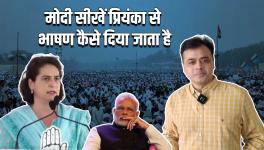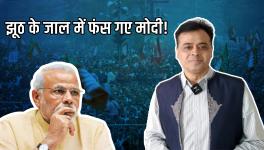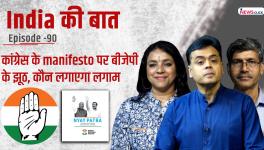Cash Transfers - In the Neoliberal mould of social assistance
Associate Professor, R.Ramakumar of the Tata Institute of Social Sciences comments on the proposed Cash Transfers Programme in India.
Part I of interview by Newsclick India.
Part II of Interview
Transcript- Part I
Srinivasan Ramani (SR) - Hello and welcome to Newsclick. Today we have with us over Skype, R. Ramakumar, agrarian economist and Associate Professor, Tata Institute of Social Sciences (TISS), Mumbai. We shall discuss with him, the much touted Cash Transfer Program, which was announced by the Indian Finance Minister, Pranab Mukherjee, in his Union Budget speech. What exactly is this Direct Cash Transfer Program?
R. Ramakumar (RR) - Direct Cash Transfer is a rather new entrant into the sphere of Social Policy. It typically means that the state is transferring a specific amount of money to a person to help him cross a particular barrier. In the absence of the transfer, the person would suffer; typically, an entitlement failure, in the sense of not being able to cross that barrier. An example could be income property. There is a poor person, who falls below the poverty line by an amount of ‘Rupees x’ so you transfer ‘Rupees x’ to that person, which helps him cross the poverty line. That would be a typical example of what a direct cash transfer scheme would be. Now there are different types of Direct Cash Transfers and there are different classifications as to what these are. One could be between ‘Employment Related cash transfers’, ‘Universal cash transfers’ and ‘Means Tested cash transfers’.
SR- Where does the Indian program fit in, among these categories?
RR- It will typically fall under a Means Tested Cash Transfer as it looks like from policy documents of the government. If you look at Employment Related Cash Transfers the transfer is directly linked to the period of your tenure in a particular job. An example would be contributory pensions, in a government job. On the other hand, if you look at Universal Cash Transfers, these are flat transfers to all, without regard to their income or employment. An example would be old age pensions or widow pensions. All these would be universal cash transfers. Finally, if you look at Means Tested Cash Transfers, means testing is a method of looking at whether a person is eligible for a benefit or not. Typically these are those where the benefits are not universal, instead they are based on an application of a standard for eligibility, related to the subsistence needs of people.
SR- So it is a conditional cash transfer in that sense?
RR- It will not be a conditional cash transfer. I prefer to call it a Targeted Cash Transfer, not a Universal Cash Transfer. Conditional or Non-conditional is another classification that you can apply where, in order to be a recipient, you need to do certain things to make yourself eligible for it. Typically, it would involve something in healthcare, where you present yourself for anti-natal or post-natal care in a health institution and you get a particular cash transfer. That would be a conditional cash transfer, as opposed to a direct cash transfer, that is given to you which is not based to any conditionality. You get it whether you do something or not.
There are other classifications also, those between cash and kind. You could typically think of the public distribution system in India. It would be a transfer in kind. But the government is not talking about transferring kind. All of these, regardless of the classifications, are characterised by a transfer of cash to the beneficiary instead of a general service provided to the people, which in turn helps people overcome different social barriers
SR- And that is what the current welfare mechanism is, is it not? That’s what already is in place.
RR- The assumption here is that Cash would enable people to purchase a service rather than the government providing it directly. Now I’ll take one minute to explain it in a particular context. The entry of cash transfers into social policy is relatively new and undoubtedly, we have to understand that it is related to the neo-liberal turn that social policies have taken across the world. For many years, if you take social policy, the European welfare state model was the predominant one. We also know that the modern welfare state model is primarily based on the Beveridge report of 1942, in Britain. If you recall, that report had recommended the establishment of a particular national minimum level of income, then a centrally administered national system of universal social insurance, which is comprehensive in coverage and scope and which will cover all kinds of sections of people and where no Means Testing is involved. So typically, in Britain, healthcare has been provided to everyone, at a moderate charge, through the NHS. Post the Second World War, this is what most European states had adopted. It’s important to understand that post-Beveridge or post-Second World War, the European welfare state model was not one of a smooth political consensus over the nature of that welfare state. It was actually a period of stiff contestations over the welfare model, between working people on one hand and the corporations and the liberals on the other. And this contestation, if you look at the larger picture, had finally resulted in the rise of neo-liberalism as an ideology, a global scheme. With the rise of neo-liberalism comes the fall of the idea of social insurance and the rise of the idea of social assistance.
SR- Which has been pointed out by economists such as David Harvey.
RR- This is one of the things writers such as Harvey have noted, this movement from social insurance to social assistance and this was a shift driven by a desire to push budget deficits down and so, typically, this took the form of compensation for workers, who had lost jobs as part of the liberalized market policy. Or compensation for income insecurity or employment insecurity. A classic case in this regard is Mexico. In places where direct cash transfer is being celebrated as a successful model, these were products of a particular ideology. These were the result of a movement from social insurance to social assistance, as the predominant form of social contract between the state and the citizen. I think this context is very important.
SR- This is the larger context within which you can situate this program, but to be a bit more specific, the proponents of this program say that it is some kind of effective substitute, in itself, to the established indirect subsidies regime, that is in place in India for fertilizers, for fuel and for food, etc. So within this context itself, people say that the direct cash transfer program is far more effective. Do you agree with that?
RR- The simple answer is no, and I can show it in many ways. The point that you’re making, the policy thinking in India is reflected for instance last years economic survey report chapter 2. That is economic survey 2009-2010, and also this year’s budget speech talks about direct cash transfers as a possible solution to reducing the budget deficit and reducing government expenditure in what the government calls inefficient subsidy policies. Now take the case of fertilizers, I think the case made here, by the government, is astoundingly foolish. The Budget, if you look at the budget speech, talks about direct cash transfers to BPL population in fertilizers, forgetting that most BPL households may actually be landless. So let’s rest the case of fertilizers there and take the case of the more important sphere of food subsidies. Here the argument is that giving cash instead of food can lead to lower transaction costs on the part of the state, faster delivery, more choice for people, in terms of what food to buy, and that ultimately this can lead to the reduction of leakage of food subsidies which are found. Here many people wrongly make use of the writings of Amartya Sen in saying that this will help the poor expand their food entitlements because they get more choice by food.
Now let’s come to the problems with this. First one has to place this in a historical context, in the sense that the emergence of the Public distribution System (PDS) in India was part of the formulation of a national food policy in the 1960’s in India, which was put in place to take care of the interests of both consumers and producers. So it was an integrated policy. The green revolution that happened in the 60’s and 70’s was highly imbalanced. It had biases across crops, across classes, across regions and as a result there were a few surplus regions in the country, in terms of food production, and large deficit regions in other parts of the country. So, the Agricultural Price Commission was appointed. The Food Corporation of India was established and using the instruments of support price and procurement price, food was to be procured from farmers, which was supposed to be produced as support and then distributed to the consumers through the PDS at subsidized prices.
This is an integrated system of food procurement and distribution. This also means that any weakening of the PDS would also mean the weakening of support price and procurement price, which are supports to the farmers. This integrated nature of India’s food policy is often ignored completely when people talk about simply discarding the PDS and introducing the cash transfers to farmers or even consumers. I think this is the most important problem if you introduce cash transfers. You will actually be doing away with the very important institutional public support structure to India’s farming community and that’s going to create an extremely averse impact on issues like profitability of farming in India. There’s no question about it.
Get the latest reports & analysis with people's perspective on Protests, movements & deep analytical videos, discussions of the current affairs in your Telegram app. Subscribe to NewsClick's Telegram channel & get Real-Time updates on stories, as they get published on our website.




















